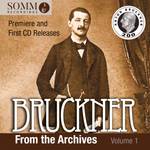|
Back
02/07/2024
“Bruckner: From the Archives, Volume 1”
Anton Bruckner: Symphony in F minor, WAB 99 [1] ^ – March in D minor: Allegro risoluto, WAB 96 [2] – Three Pieces for Orchestra, WAB 97 [2] – Psalm 112, WAB 35 [3] – Overture in G minor, WAB 98 (rev. 1863) [4] ^ – Symphony n° 1 in C minor, WAB 101 (Linz version, ed. Nowak) [5] ^ – String Quartet, WAB 111 [6, 7] ^
Koeckert Quartet : Rudolf Koeckert, Willi Buchner (violin), Oskar Riedl (viola), Josef Merz (cello) [6], Bruckner Orchestra, Linz [1], Vienna Symphony Orchestra [2, 3], Vienna Akademie Kammerchor [3], WDR Symphony Orchestra, Köln [4], Bavarian Radio Symphony Orchestra [5], Kurt Wöss [1], Hans Weisbach [2], Henry Swoboda [3], Dean Dixon [4], Eugen Jochum [5] (conductor)
Recording: Live Aircheck (June 11, 1974) [1], Family Records, SFLP-541 (May 9, 1944) [2, 3], Westminster LP, XWN18075 (1950) [4], WDR Aircheck (1959) [5], Bavarian Radio Aircheck (January 1, 1959) [6], NDR Aircheck (March 9, 1951) [7] (^ First release) – 147’09
Somm Recordings Ariadne 5025-2 – Booklet in English
   

With this release begins Somm’s entry into the Bruckner bicentennial sweepstakes, a collection of rare or hitherto unpublished recordings of all the symphonies (and some other works) mostly from the 1950s and ‘60s. These are being released chronologically by order of composition, so that the major work, such as it is, in this first volume is the First Symphony, as conducted by Eugen Jochum in a 1959 Munich aircheck. If this performance adds anything interpretively to the conductor’s studio recording of a few years later with the generally superior Berlin Philharmonic, an account that also has the advantage of stereo sound, I missed it, but perhaps it’s mainly that the more I try to get interested in this work, the more it puts me off. The lack of memorable thematic material is bad enough; more significant, perhaps, is the frequent appearance stock Brucknerian techniques without the wonderful dramatic and expressive effects the composer would soon learn to derive from them. Here, for instance, we get lots of slightly agitated sequences and ostinatos without the hypnotic quality these often take on so strikingly in the later works. But Bruckner was evidently going for something mischievous in this work, which he dubbed “The Saucy Maid”, and so Jochum’s greatest weakness as a Brucknerian, impatience or a general difficulty with solemnity, is not really an issue here. If you enjoy the First more than I do, I can assure you that this performance is not phoned in—but then again, neither is the Berlin studio version. This is redundant in an area with little margin for redundancy.
The student Symphony in F minor, the “Double Zero,” is a somewhat less hectic piece, with some ingratiating ideas here and there, such as the first movement’s second subject, but nothing really memorable. Kurt Wöss leads a vigorous and musical, if only fitfully polished reading, captured in thin, congested 1974 broadcast stereo. The orchestral and choral fillers come in lively and committed performances, all in respectable mono. But best of all is the aircheck of the world premiere—in 1951—of the String Quartet, another student work but this time really assured and effective, with well-delineated themes and some tasty counterpoint. Bruckner here shows himself so comfortable writing for four exposed voices that it’s a pity he never revisited the form. If you like Schumann’s string quartets, this in the same vein, but perhaps more tightly constructed. The ensemble, the Koeckert Quartet, dealt in the same now vanished (as far as I can tell) style of German quartet playing as the slightly earlier Busch Quartet: singing phrasing, seriousness of purpose, and full‑bodied tone without gloss, if also without the Busch’s unique degree of intensity and imagination. In any event, the Koeckert gives an eloquent and secure reading of the work in question, in excellently clear and warm sound for its age. About ten years later, another German ensemble, the Keller Quartet, would give this work what I think was its first commercial recording, this time in stereo, and with a performance of comparable warmth and musicality but perhaps a touch less weight. I’m not sure the special qualities of the Koeckert version warrant purchasing the whole set under review unless you have a special fondness for Bruckner’s earliest symphonic efforts, but I am certainly happy to have heard this recording of the Quartet. On the whole, if everything in this collection had to have been exhumed, I would rather have had it as a kind of appendix to a larger box than as the first foot forward of a major commemorative series.
Samuel Wigutow
|